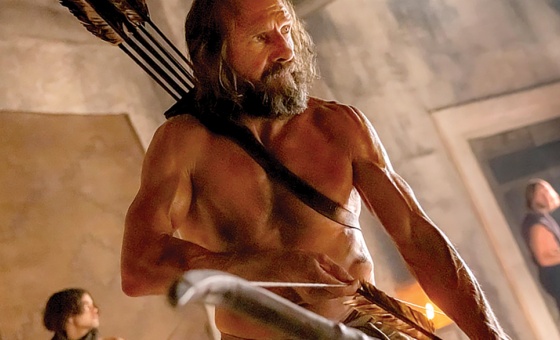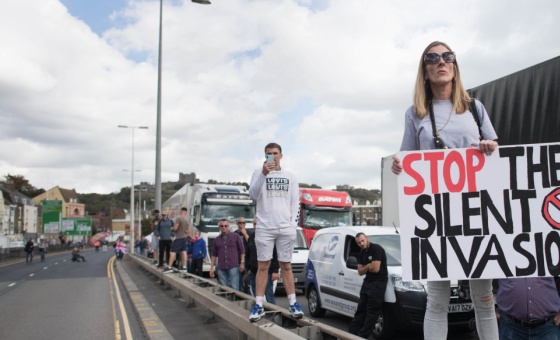This is the last article you can read this month
You can read 5 more article this month
You can read 5 more articles this month
Sorry your limit is up for this month
Please help support the Morning Star by subscribing here
Try to imagine a US political party calling for conversion to a political, economic, and social system similar to that of the People’s Republic of China. Let that party or grouping have no stable or defined leadership, or a coherent ideology other than opposition to the prevailing order in the US and embracing the Chinese model.?
And maybe it defines itself as the genuine representative of US society, yet stands for no real interest of any one social sector in particular. Let’s further suppose that the Chinese government, as part of its official foreign policy, granted this grouping hundreds of millions of yuan in order to promote a so-called project of “peaceful evolution” toward a model whereby the country adopts intimate relations with China.?
Finally, imagine that the People’s Republic of China was located exactly where Canada is today — with a population 30 times bigger and an economy 233 times stronger than that of the US, which, for half a century, in this scenario, has had very bad relations with this country. And maybe this imaginary Chinese president insisted on being photographed with the leaders of such a grouping.?
How would the US government react? Would it put this group in prison at the Guantanamo naval base without any right to a trial or legal protection? Would it regard the group as a peaceful protest movement because it doesn’t incite armed rebellion??
Perhaps the US government would limit itself to charging the group with collaborating with a foreign power, thus exposing the group only to several life sentences. Or, might it be possible to identify the group as a legitimate opposition organisation, proposing to exercise its civil rights as it protests the established order, cultivates free thought and its members behave like good citizens??
Would US citizens see the group as defenders of democracy and pluralism, capable of engaging in dialogue and respecting those who don’t share their ideas?
Would they view members of the group as standard-bearers of freedom of expression, by virtue of their means of communication that are neither partisan nor dedicated to disowning the system but rather to playing a role of providing information that is balanced and independent of any political tendency?
?Would the US government recognise the group’s political and intellectual leaders as capable of leading the country along the road of human development, independence, and participatory democracy?
?If all of the above is taken into consideration in a spirit of equanimity — even if one may eventually disagree with the Cuban policy towards the dissidents — it must be appreciated also that there’s more involved than simple ideological impulsiveness, incompetence in dealing with dissenters, mental fog or just plain evil.?
Naturally, the explanation does not rest on the assumption that these people themselves pose a real threat to Cuba’s national security. They are not the problem — it’s Washington’s policy of giving them support.?
We still hear about “bringing democracy and human rights to Cuba,” which means much more than objecting to “the Castros” and “the export of revolution.” It’s about transforming the social, economic and political order of the country in their image and likeness, it is about: “promote our values,” as Barack Obama said on December 17 2014.?
Beginning with Brigade 2506 — those Cuban exiles defeated militarily at the Bay of Pigs in 1961 — until today, Cubans on the island have regarded Cuban political exiles as a function of US policy dealing with the revolution. Obama’s statement in that context showed that it wasn’t the tail wagging the dog, but the dog doing the deciding.?
In terms of realpolitik, the main question after re-establishing relations on December 17 were the options of confronting the dissidents as subversives (putting them in prison), using them as a bargaining chip when the time comes to negotiate with the US (in case they consider returning the Guantanamo base), or applying the full extension of the present Cuban law to them.
In each of these alternatives, we would end up turning them into victims, or for some of the Western media, into heroes. The question now is whether or not this opposition is really contributing to Obama’s policy.?
We need to understand that this policy is already hooked into another logic — that of dialogue and negotiation. Pressure, ideological confrontation and coercion are not excluded, but they come into play differently.
The media on the island tirelessly harps on the idea that the US has not given up on its objectives. That highlights an obvious truth for Cubans that they must not trust their powerful neighbour — it remains as imperialist as ever and has only “changed its methods.”
However, if one thoroughly examines all this about “changed methods,” the new policy harbours large-scale implications.?
In effect, US strategic formulation is aimed at opening up a highway for communicating with the heart of the Cuban political system. This represents an alternative to a half-century of ineffective brute force.?
For example, to influence young people, it’s not so much the hip hop groups (who haven’t unleashed revolutions anywhere), but rather government leaders, provincial Communist Party officials, the armed forces and the state security, the technocrats, and the scientific, educational and cultural institutions.?
To get in touch with the economy evolving following Raul Castro’s reforms the main targets are not just private businessmen who own paladars and food marketing services, but to the broad layer of managers heading up the new public sector, anxious to gain efficiency in production and business methods.?
This policy aims to reach not only artists and film-makers generating provocative work, but mainly to the thousands of social communicators and journalists who work in the government media system. They are more adept with the internet and they complain, with reason, about limited access to broadband and free wifi. They even look to CNN or the Discovery Channel as models.?
Will entry onto this information highway be left in the hands of the dissidents? As for those congressmen and women of Cuban descent — well-known for their ultra-conservative persuasion who support dissidents on the island — will they be the bridge between Cuban entrepreneurs on either side of the Florida Straits??
We must not forget that politics is mostly a strange kind of theatre. Jose Marti used to say that, in such a production the most real thing is what is unseen.
Significantly a former US interests section chief reported to the State Department: “There are few if any dissidents who have a political vision that could be applied to future governance… it is unlikely that they will play any significant role in whatever government succeeds the Castro brothers.”
?This wouldn’t be the first time that the two paths of the US government and that of this peculiar Cuban opposition have diverged. The missile crisis had hardly cooled down when president John Kennedy accepted the flag of Brigade 2506 members and promised to return it as soon as they triumphantly entered a “free Havana.”
Over 52 years after Kennedy’s speech in Miami’s Orange Bowl stadium, nearly 300,000 Cuban-Americans, including descendants of Brigade 2506 members, continue to arrive on the island although not precisely to the tune of war.?
Those average Cubans, embracing their cousins in Havana’s Terminal 2, aren’t up there on the dissidents’ wagon, nor are they still waving that flag but rather one that expresses their peaceful return to the land where they were born.
They are going back to a Havana that is being revitalised little by little — or to a beach where they will retire, now that they see the promise of normalisation engulfing Cuba.?
- Rafael Hernandez is the editor of Cuban quarterly journal Temas and expert on Cuba-US relations, he will be joined by former diplomat and commentator Carlos Alzuagay and Arleen Rodriguez, a prominent Cuban journalist, plus other experts on Cuba at the Cuban Futures Conference which is organised by the Cuba Solidarity Campaign and South East Region TUC International Committee. For more information see www.cuba-solidarity.org.uk ?









